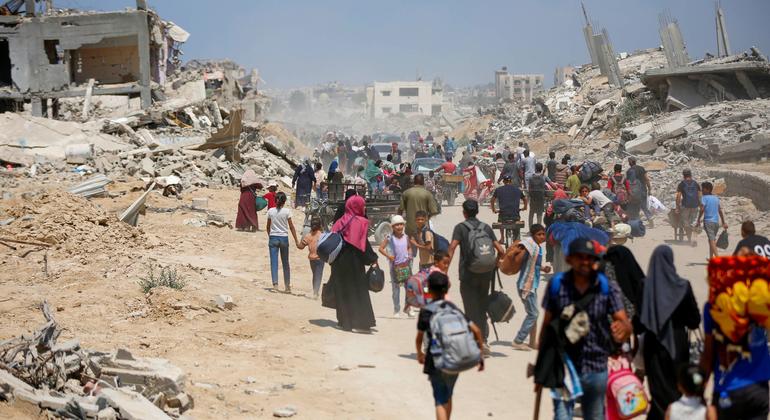Gaza: Evacuation orders displace thousands, disrupt relief operations


Meanwhile, hundreds of people remain trapped east of Khan Younis as fighting continues.
“Once again, we stress that all parties to the conflict must respect their obligations under international humanitarian law, including by taking continued care to protect civilians and civilian objects,” speak United Nations deputy spokesman Farhan Haq speaks in New York.
“This includes allowing civilians to leave for safer areas and allowing them to return as soon as circumstances allow. Everyone must be able to receive humanitarian assistance, regardless of whether they move or stay.”
Humanitarian activities affected
On Monday, the Israeli army ordered residents to leave Khan Younis.
United Nations Office for the Coordination of Humanitarian Affairs, OCHAsaid evacuation orders and intense fighting had destabilized relief operations and hampered efforts to provide vital aid to people.
A dozen food distribution sites and eight cooked meal distribution sites were forced to shut down this week. Nutrition programs at two shelters that serve more than 2,800 children and pregnant women were also disrupted.
In addition, 10 water and sanitation facilities were also affected, including reservoirs, desalination plants and wastewater pumping stations that had to stop operating.
Six educational partners in Khan Younis also had to close, affecting about 20,000 children who benefited from recreational and mental health activities, along with about 1,500 others in 10 temporary learning spaces.
Medical deployment halted
Furthermore, efforts to deploy additional medical teams to Gaza have been hampered by the ongoing insecurity and the single entry point for humanitarian workers, the Kerem Shalom crossing.
OCHA noted that none of Gaza’s 36 hospitals are functioning. Although 16 hospitals are partially functioning, some provide only minimal health care.
The UN agency added that efforts to collect and deliver humanitarian aid into Gaza continue to be hampered by limited access, ongoing hostilities, damaged infrastructure and lack of public order and safety.
After Israel’s Rafah operation began in early May, the volume of aid that could be collected from the crossing points dropped by 56 percent since April.




